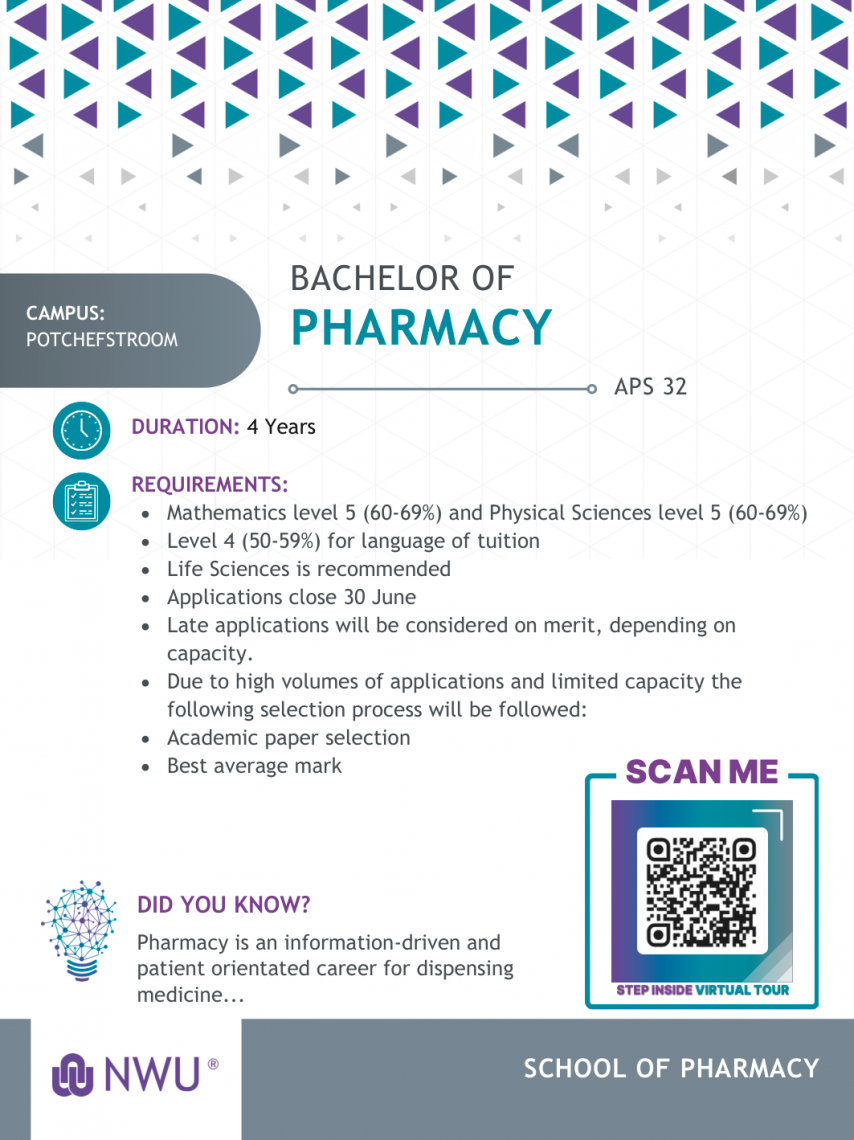
1. What is Pharmacy?
The profession of a pharmacist is dynamic, information driven, patient-orientated and takes responsibility for medicine in all its facets by acting as a:
- Supervisor of medicine;
- Formulator, producer, distributor and controller of safe, effective and quality medicine;
- Advisor on the safe, rational and applicable usage of medicine;
- Provider of essential clinical services including screening tests and referral services;
- Provider of health care education and information;
- Provider of pharmaceutical care by accepting responsibility for the outcomes of therapy and by being actively involved in the design, implementation and monitoring of pharmaceutical care plans; and
- Provider of cost-effective and efficient pharmaceutical services.
2. What does the Pharmacy degree entail?
To equip students with knowledge, skills and competencies in order to render professional pharmaceutical services as members of a health team.
On successful completion of the program and the compulsory internship pharmacists should have the following competencies:
- Organisation and control of the production, packaging and
- Quality insurance of pharmaceutical products;
- Organisation and control of the acquisition, storing and
- Distribution of pharmaceutical material and products;
- Dispense and ensure the optimal use of prescribed medicine;
- Provide pharmacist initiated treatments of patients and ensure the optimal usage of medicine;
- Provide education and information on health care and medicine;
- Improve community health and provide relevant information and advise; and
- Part-take in research to ensure the optimal usage of medicine.
3. Fields of study.
A young qualified pharmacist has a wide choice of career possibilities depending on his or her own preference. It includes Community Pharmacy, Hospital Pharmacy (private and public) and the Pharmaceutical Manufacturing Industry. Other career possibilities include Wholesale pharmacists, healthcare managers, medicine control officers. These occupations exist in the form of medical aid funds, local and central governments ect. Research occupations also exist at universities and colleges as well as the MRC - thus a variety of diverse occupations which will suit your needs and preferences.
4. Manner of presentation and duration of the programme.
The program is presented full-time and covers a period of four (4) years. On completion of the degree, and before registration as a pharmacist at the South African Pharmacy Council (SAPC), students must complete a yearlong internship at a community pharmacy, hospital pharmacy or in the pharmaceutical industry. Students may also complete an academic internship (usually two years) at the university during which the successful students obtain an M degree. After internship (general or academic) and the successful completion of an admission exam, students may register as a pharmacist.
Newly qualified pharmacists are obliged by law to complete one year of community service before they enter the labour market.
5. What are the admission requirements for the degree?
- National Senior Certificate with university entrance;
- Mathematics level 5 (60-69%)
- Physical Science level 5 (60-69%);
- A minimum APS-score of 32
- Language requirement: A pass mark of 50-59%(level 4) in the language of teaching and learning concerning home language or first additional language level.
6. What is the selection process for the degree?
- Complete an application form for admission to the University (provide grade 11 final marks) – before end of June.
- Applicants should provide their June grade 12 exam results to me Hannelie Nortjé in the office of the BPharm Program Manager by means of
- e-mail Hannelie.Nortj@nwu.ac.za or fax 087-231 5429
IMPORTANT: If we did not receive a copy of your grade 12 June exam marks by the end of the 2nd week of August (or as soon afterwards as the results become available) we will presume that you no longer want to study Pharmacy at the NWU.
- “Preliminary selection” of approximately 160 “new” candidates is done from the 3nd week of August where the following will be used to calculate a quantitative selection value:
- grade 12 marks of the June exam (especially the marks for Mathematics and Physical Science and the APS score)
- The applicants are ranked (from highest to lowest according to their respective selection values) and the top 160 candidates are placed on the “provisionally selection list”.
- Successful applicants are notified by e-mail or SMS.
- Selection will only be finalized once the final matric results are available (normally early January).
- PLEASE NOTE: If a candidate has been “selected provisionally” for Pharmacy, he/she can consider his/her selection as “final” if his/her final matric results comply with the selection criteria.
7. Postgraduate studies.
After completion of this degree, you will be able to continue with a:
- Postgraduate study at the Center of Excellence for Pharmaceutical Sciences, MSc in Pharmaceutical Chemistry / Pharmacology /Pharmaceutics
- PhD in Chemistry / Pharmacology / Pharmaceutics
- Postgraduate study at the Nisarea: Medicine Usage in South Africa, MPharm Pharmacy Practice and a PhD in Pharmacy Practice.
